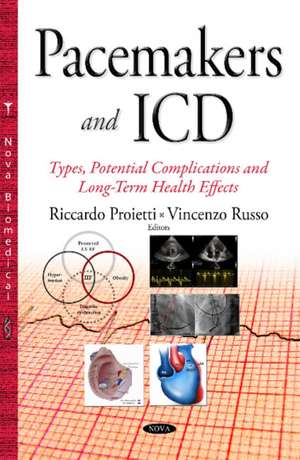Pacemakers & ICD: Types, Potential Complications & Long-Term Health Effects
Editat de Riccardo Proietti, Vicenzo Russoen Limba Engleză Hardback – dec 2015
Preț: 1951.60 lei
Preț vechi: 2185.35 lei
-11% Nou
373.44€ • 406.92$ • 314.68£
Carte indisponibilă temporar
Specificații
ISBN-10: 1634834917
Pagini: 360
Dimensiuni: 180 x 260 x 24 mm
Greutate: 0.81 kg
Editura: Nova Science Publishers Inc
Colecția Nova Science Publishers Inc
Cuprins
For Complete Table of Contents, please visit our website at: https://www.novapublishers.com/catalog/product_info.php?products_id=55721
Descriere
Cardiac pacing is one of the most rapidly growing fields in medicine. This growth is stimulated by several challenges unique to this subspecialty: the high prevalence of diseases that require cardiac pacing; the wide range of age groups that undergo this therapy; the technological advancements that improve safety and feasibility of the procedure; the long-term performance of the devices implanted; and the potential long-term complications. Historically, the field of cardiac pacing was in the hands of cardiac surgeons and gradually absorbed into the specialty of cardiology. The need for a more specialised training to address the peculiarities of cardiac pacing brought about the formation of clinical electrophysiology as a subspecialty. In addition to clinical competence and knowledge, a basic understanding is required of cardiac pacing technologies and the science behind them. While there are many books on this topic, some comprehensive and others addressing specific issues, Pacemakers and ICD: Types, Potential Complications and Long-Term Health Effects is intended to occupy a middle ground. This book gathers information on a number of aspects not typically treated in detail in other books but of high clinical relevance. It follows the different stages of cardiac pacing from the surgical technique of the implant to the impact on long-term health after the procedure. Of particular interest are contributions from leading experts on alternative sites of pacing, less understood complications, psychological effects and fresh approaches to the clinical management of patients with implantable cardiac devices. Recent technologies and forecasts of the field, including leadless pacemakers and subcutaneous ICD are also discussed.
